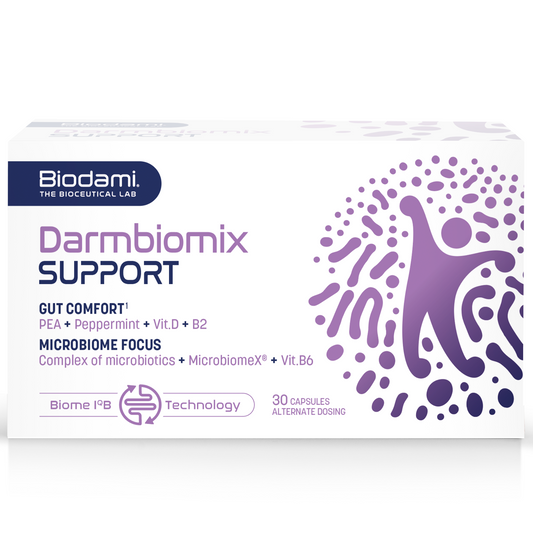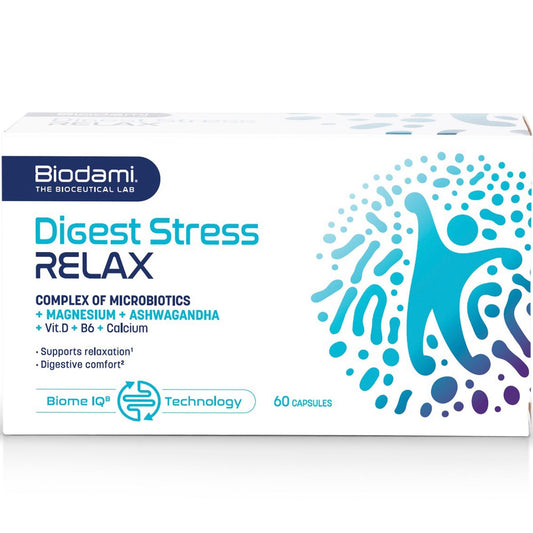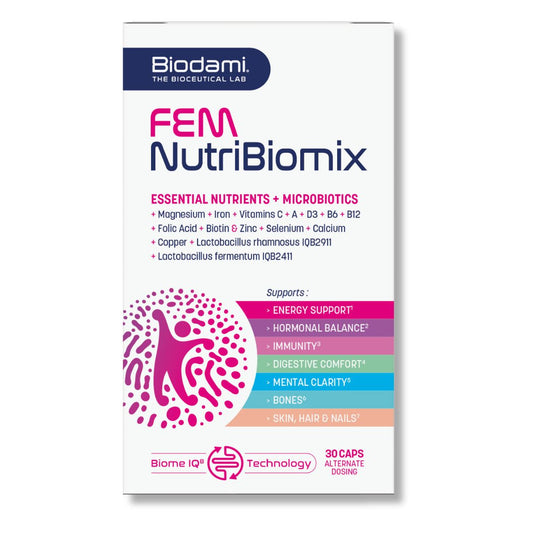WHAT is Irritable Bowel Syndrome (IBS)?
Irritable Bowel Syndrome (IBS) is a common functional gastrointestinal disorder characterized by chronic abdominal pain and altered bowel habits without any identifiable structural or biochemical abnormalities. The etiology of IBS is multifactorial and not entirely understood. However, several factors are believed to contribute to its development and symptomatology:
Genetic Factors: While the genetic basis of IBS may be limited to select individuals, certain genetic abnormalities have been proposed, including
- Abnormality in serotonin receptors
- Abnormality in sodium ion channels.
- Altered bile acid metabolism.
- Defects in proteins involved in immune responses.
Central Nervous System:
- The central nervous system's processing of afferent gut signals- the way the brain interprets the signals from the gut.
- Hormonal influences, such as estrogen and progesterone.
- Visceral hypersensitivity- heightened sensitivity in the gut leading to increased pain sensations.
Gastrointestinal Factors:
- Altered motility-the changes that occur in the movement of the digestive tract.
- Immune-mediated changes following infections.
- Increased levels of mast cells - activated immune cells in the gut
- Increased intestinal permeability.
- Dietary influences, including sensitivities or tolerances.
- Changes in the gut microbiome, known as dysbiosis. (Read our blog on the role of the microbiome in IBS)
- Hormonal influences.
Psychological Factors:
- The presence of anxiety.
- Experiences of depression.
- The impact of stress.
WHAT ARE THE SUBTYPES OF IBS?
Irritable Bowel Syndrome (IBS) is commonly classified into three main subtypes based on the predominant bowel habit and based on the Rome IV criteria which are a set of diagnostic guidelines used to identify functional gastrointestinal disorders such as IBS. Some countries subtype IBS according to the main stool pattern identified by the Bristol Stool Form Chart.
-
IBS-C (Irritable Bowel Syndrome with Constipation):
- Predominant symptoms include abdominal pain or discomfort associated with constipation.
- Stool is often hard and lumpy.
-
IBS-D (Irritable Bowel Syndrome with Diarrhea):
- Predominant symptoms include abdominal pain or discomfort associated with diarrhea.
- Stool is often loose and watery.
-
IBS-M (Irritable Bowel Syndrome with Mixed Bowel Habits):
- Symptoms include abdominal pain or discomfort associated with both constipation and diarrhea.
- Stool may alternate between hard and lumpy and loose and watery.
Additionally, there is a fourth subtype known as:
4. IBS-U (Irritable Bowel Syndrome Unclassified):
- This subtype is used for patients who do not fit neatly into the other three categories.
- Symptoms may include abdominal pain or discomfort associated with an irregular bowel pattern that does not consistently meet the criteria for constipation or diarrhea.

CONSEQUENCES OF IBS:
While IBS does not increase mortality rates, it is linked to higher morbidity. Quality of life assessments reveal that individuals with IBS generally experience a lower quality of life compared to the broader population and those with various chronic physical illnesses. The condition significantly impacts occupational productivity and the ability to engage socially. The extent of IBS symptoms, along with associated non-digestive physical symptoms, anxiety, and fatigue, directly influences a patient's presence and effectiveness at work. Notably, IBS characterized by predominant diarrhea tends to lead to more pronounced declines in quality of life, daily functioning, and work productivity, often resulting in increased absenteeism and presenteeism (the act of attending work while unwell) relative to those without IBS.
The multifactorial nature of IBS, encompassing physical, dietary, and psychological aspects, needs a holistic approach to treatment and management, tailored to the unique needs of each patient. There is the need for a multidisciplinary approach in both research and clinical practice to effectively address the various dimensions of this complex condition.
IBS TREATMENTS AND RECOMMENDATIONS
Treatment approaches can broadly be divided into general lifestyle advice, medical therapy, dietary and non-pharmaceutical interventions.
Based on the collective wisdom of clinical experts in Belgium, a set of first-line treatment recommendations for Irritable Bowel Syndrome (IBS) has been established to guide clinical practice in addressing patient needs effectively. However, it's crucial to consult with your physician if you experience symptoms associated with IBS. Your doctor can provide personalized treatment and medical advice tailored to your specific condition.
Spasmolytics: These are medications or substances that help relax the muscles in the intestines, reducing spasms and alleviating abdominal pain and discomfort commonly associated with IBS. Peppermint (oil) is an example.
Water-Soluble Fibers: These fibers dissolve in water and can help regulate bowel movements, particularly beneficial for IBS with constipation.
Herbal Medicines: Certain herbal remedies may offer relief from IBS symptoms, though their effectiveness can vary.
Dietary Changes: Implementing a Low FODMAP diet, which involves reducing certain carbohydrates that are hard to digest, can significantly improve symptoms. Reducing fructose intake is also recommended, while going gluten-free is not necessary unless gluten sensitivity is present.
Microbiome Management: Probiotics that have demonstrated a beneficial effect can be useful in balancing gut microbiota, potentially easing IBS symptoms. (Read our blog on the role of the microbiome in IBS)
For Diarrhea-Predominant IBS (IBS-D):
- Bile Acid Sequestrants: These medications bind to bile acids in the intestine, which can be helpful if diarrhea is caused by an excess of bile acids.
- Loperamide: This medication slows down gut movement and can reduce diarrhea by allowing more water to be absorbed from the bowel contents.
For Constipation-Predominant IBS (IBS-C):
- Osmotic Laxatives: These help the bowel retain more water, which softens stools and aids in bowel movements.
Non-Pharmacological Interventions:
- Cognitive Behavioral Therapy (CBT): This psychological approach can help manage the stress and anxiety that often exacerbate IBS symptoms.
- Biofeedback: Helps patients gain control over certain bodily functions, potentially improving IBS symptoms.
For Pain Management:
- Tricyclic Antidepressants (TCAs): These medications can help alleviate pain in IBS by affecting the way the brain processes pain signals.
- Selective Serotonin Reuptake Inhibitors (SSRIs): While primarily used for depression, SSRIs can also be effective in managing pain and other symptoms of IBS.
Remember, the best course of action should always be determined in consultation with a healthcare professional who can tailor the treatment to your individual needs.
Recommended For You
Kristina Cueva
Kristina has always had a passion for understanding diseases and their underlying mechanisms. With a Biomedical sciences background as well as Public Health & Economics, Kristina understands the burdens diseases have on society. This helps her understand the necessary innovations to promote good health which ultimately lower burden of disease.
------------------------------------------------------------------------------------------------
References:
Bennet SM, Ohman L, Simren M. Gut microbiota as potential orchestrators of irritable bowel syndrome. Gut Liver. 2015 May 23;9(3):318-31. doi: 10.5009/gnl14344. PMID: 25918261; PMCID: PMC4413965.
Kindt S, Louis H, De Schepper H, Arts J, Caenepeel P, De Looze D, Gerkens A, Holvoet T, Latour P, Mahler T, Mokaddem F, Nullens S, Piessevaux H, Poortmans P, Rasschaert G, Surmont M, Vafa H, Van Malderen K, Vanuytsel T, Wuestenberghs F, Tack J. Belgian consensus on irritable bowel syndrome. Acta Gastroenterol Belg. 2022 Apr-Jun;85(2):360-382. doi: 10.51821/85.2.10100. PMID: 35709780.
Pimentel M, Lembo A. Microbiome and Its Role in Irritable Bowel Syndrome. Dig Dis Sci. 2020 Mar;65(3):829-839. doi: 10.1007/s10620-020-06109-5. PMID: 32026278.
Quigley EM, Bytzer P, Jones R, Mearin F. Irritable bowel syndrome: the burden and unmet needs in Europe. Dig Liver Dis. 2006 Oct;38(10):717-23. doi: 10.1016/j.dld.2006.05.009. Epub 2006 Jun 27. PMID: 16807154.
FIND OUT HOW OUR DARMBIOMIX CAN HELP SUPPORT YOUR GUT
Darmbiomix SUPPORT
- Regular price
- €37,26
- Promotional price:
- €37,26
- Regular price
-
€74,51 - Unit price
- per







